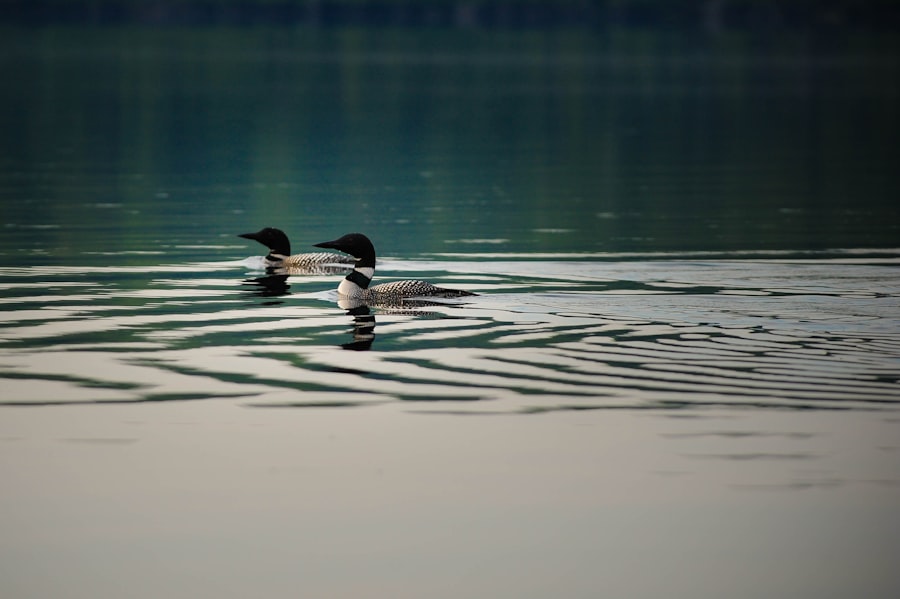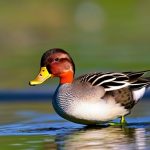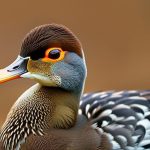Ducks have been domesticated for thousands of years, with evidence of their presence dating back to ancient Egypt and China. These birds were initially kept for their meat and eggs, but over time, they have also become popular as pets. Keeping ducks as pets can be a rewarding experience, as they are not only adorable but also have several benefits.
One of the main benefits of keeping ducks as pets is their ability to control pests. Ducks are natural foragers and love to eat insects, slugs, and snails. This makes them excellent at keeping gardens and yards free from pests without the need for harmful chemicals. Additionally, ducks are known for their calm and gentle nature, making them great companions for both adults and children.
Key Takeaways
- Keeping ducks as pets can be a rewarding and enjoyable experience.
- There are many different breeds of ducks, each with their own unique characteristics.
- Popular pet duck breeds include Pekin, Muscovy, and Call ducks.
- When choosing a duck breed, consider your lifestyle and the amount of space you have available.
- Proper care for pet ducks includes feeding, housing, and monitoring their health, as well as training and socializing them for optimal happiness and well-being.
Understanding the Different Breeds of Ducks
There are numerous breeds of ducks available, each with its own unique characteristics. Some of the most popular duck breeds include Pekin, Mallard, Muscovy, Rouen, and Call ducks. These breeds vary in size, color, and temperament.
Pekin ducks are one of the most common breeds kept as pets due to their friendly and docile nature. They have white feathers and orange bills, making them easily recognizable. Mallard ducks, on the other hand, are smaller in size and have beautiful green heads with brown bodies. They are known for their vibrant colors and adaptability.
Muscovy ducks are larger in size and have a unique appearance with red wattles around their face. They are known for being quiet and friendly, making them great pets for families. Rouen ducks resemble wild Mallards but are larger in size. They have a calm temperament and make excellent pets.
Call ducks are the smallest breed of domesticated ducks and come in various colors such as white, gray, or black. They are known for their high-pitched calls and playful nature.
Characteristics of Popular Pet Duck Breeds
Pekin ducks are known for their friendly and sociable nature. They are easy to handle and enjoy human interaction. Pekin ducks are also excellent layers, producing large white eggs. They are relatively low-maintenance and adapt well to different environments.
Mallard ducks are more independent and have a wilder nature compared to other breeds. They require more space and freedom to roam. Mallards are known for their beautiful plumage and ability to fly. They make great pets for those who have larger outdoor spaces.
Muscovy ducks are known for their calm and gentle temperament. They are highly adaptable and can thrive in various climates. Muscovies are also excellent foragers and can help control pests in the garden.
Rouen ducks have a calm and friendly nature, making them great pets for families. They are larger in size and have beautiful plumage, resembling wild Mallards. Rouen ducks are also good layers, producing medium-sized eggs.
Call ducks are small in size but have big personalities. They are known for their playful and curious nature. Call ducks require less space compared to other breeds, making them suitable for those with limited outdoor areas.
Choosing the Right Duck Breed for Your Lifestyle
When selecting a duck breed as a pet, there are several factors to consider. Firstly, you need to assess your living situation and available space. Some breeds, like Mallards, require more space to roam and may not be suitable for those living in urban areas with limited outdoor space.
Secondly, consider your level of experience with ducks. Some breeds, like Pekin ducks, are easier to handle and require less maintenance compared to others. If you are a first-time duck owner, it may be best to start with a breed that is known for its docile nature.
Lastly, consider your personal preferences in terms of appearance and temperament. Each breed has its own unique characteristics, so choose one that aligns with your preferences and lifestyle.
Caring for Your Pet Duck: Feeding, Housing, and Health
Feeding ducks a balanced diet is essential for their overall health and well-being. Ducks require a diet that consists of a combination of commercial duck feed, fresh vegetables, and access to clean water. It is important to provide them with a balanced diet to ensure they receive all the necessary nutrients.
When it comes to housing, ducks require a safe and secure environment. They need access to water for swimming and cleaning themselves, as well as a sheltered area to protect them from extreme weather conditions. The housing should be spacious enough to allow the ducks to move around comfortably.
Ducks are generally hardy birds but can be susceptible to certain health issues. Common health problems in ducks include respiratory infections, parasites, and bumblefoot. Regular veterinary check-ups and proper hygiene practices can help prevent these issues. Providing clean water, a balanced diet, and a clean living environment are crucial for maintaining the health of your pet duck.
Training Your Duck: Tips and Tricks for Success

Training ducks can be a fun and rewarding experience. Ducks are intelligent animals and can learn various commands and tricks with consistent training. Training is important for establishing boundaries and ensuring the safety of your pet duck.
One of the most important aspects of training ducks is establishing trust and building a bond with them. Spend time with your duck, offer treats as rewards, and use positive reinforcement techniques during training sessions. Ducks respond well to consistency and repetition, so be patient and persistent in your training efforts.
Basic training techniques for ducks include teaching them to come when called, sit or stay on command, and walk on a leash. Start with simple commands and gradually increase the difficulty level as your duck becomes more comfortable with the training process.
Socializing Your Duck: Keeping Them Happy and Healthy
Socialization is crucial for the well-being of pet ducks. Ducks are social animals and thrive in the company of others. It is important to provide them with opportunities for social interaction with both humans and other animals.
To socialize your duck with humans, spend quality time with them, handle them gently, and offer treats as rewards. Ducks enjoy being petted and scratched, so provide them with physical affection to strengthen the bond between you and your pet.
Introducing your duck to other animals should be done gradually and under supervision. Ducks can get along well with other pets such as dogs and cats if introduced properly. Monitor their interactions closely and ensure that all animals are comfortable and safe.
Common Behavioral Traits of Pet Ducks
Ducks have several common behavioral traits that are important to understand as a pet owner. They are naturally curious animals and enjoy exploring their surroundings. Ducks also have a strong instinct to forage and search for food, so providing them with opportunities to do so can help keep them mentally stimulated.
Ducks are known for their love of water. They enjoy swimming, bathing, and splashing around in water. Providing a shallow pool or pond for your duck to swim in is essential for their overall well-being.
Aggressive behavior can sometimes be observed in ducks, especially during breeding season or when they feel threatened. It is important to understand the triggers for aggression and take appropriate measures to manage it. Providing enough space, ensuring proper nutrition, and avoiding overcrowding can help minimize aggressive behavior in ducks.
Breeding Ducks: Considerations for Prospective Duck Owners
Breeding ducks requires careful consideration and planning. Before deciding to breed your ducks, it is important to assess whether you have the necessary resources, time, and knowledge to care for the ducklings.
Consider the space requirements for raising ducklings, as they will need a separate area from the adult ducks. Additionally, breeding ducks requires a suitable nesting area and proper incubation equipment if you plan to hatch the eggs.
Breeding ducks also comes with the responsibility of finding suitable homes for the ducklings. It is important to have a plan in place for rehoming the ducklings before they hatch.
The Joy of Owning a Pet Duck
Owning a pet duck can bring immense joy and fulfillment. Ducks are not only adorable but also have several benefits as pets. They can help control pests, provide companionship, and bring a sense of tranquility to your life.
Understanding the different breeds of ducks and their unique characteristics is essential for choosing the right breed for your lifestyle. Proper care, training, and socialization are crucial for the well-being of your pet duck.
While owning a pet duck requires time, effort, and resources, the rewards are well worth it. The bond you can form with your pet duck and the joy they bring to your life is truly priceless. Consider ducks as pets and embark on a wonderful journey of companionship and love.
If you’re considering getting ducks as pets, you may also be interested in learning about different breeds of ducks that are suitable for keeping as companions. In a recent article on Poultry Wizard, they discuss the various breeds of ducks that make great pets and provide valuable information on their characteristics, care requirements, and temperament. Whether you’re looking for a small and friendly breed like the Call Duck or a larger and more colorful breed like the Indian Runner Duck, this article will help you choose the perfect duck for your home. Check out the article here to discover more about these delightful feathered friends.
FAQs
What are some popular breeds of ducks for pets?
Some popular breeds of ducks for pets include Pekin, Rouen, Khaki Campbell, and Muscovy.
What is the temperament of Pekin ducks?
Pekin ducks are known for being friendly and sociable, making them a popular choice for pets.
What is the size of Rouen ducks?
Rouen ducks are a large breed, with males weighing up to 10 pounds and females weighing up to 8 pounds.
What is the egg-laying capacity of Khaki Campbell ducks?
Khaki Campbell ducks are known for their high egg-laying capacity, with females laying up to 300 eggs per year.
What is unique about Muscovy ducks?
Muscovy ducks are unique in that they have a distinctive red, fleshy face and are known for their quiet nature and ability to fly well. They are also the only domesticated duck breed that is not descended from the mallard.
Meet Walter, the feathered-friend fanatic of Florida! Nestled in the sunshine state, Walter struts through life with his feathered companions, clucking his way to happiness. With a coop that’s fancier than a five-star hotel, he’s the Don Juan of the chicken world. When he’s not teaching his hens to do the cha-cha, you’ll find him in a heated debate with his prized rooster, Sir Clucks-a-Lot. Walter’s poultry passion is no yolk; he’s the sunny-side-up guy you never knew you needed in your flock of friends!







